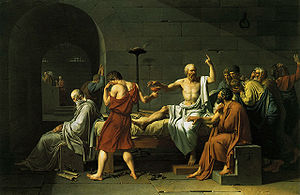
As Bob’s most recent posting suggests, Frye’s use of paradox is often Socratic in spirit, dialectical. I am reminded of one of my favorite passages in Frye concerning his teaching method, which appears in the introduction to The Great Code:
The teacher, as has been recognized at least since Plato’s Meno [80d-86c], is not primarily someone who knows instructing someone who does not know. He is rather someone who attempts to re-create the subject in the student’s mind, and his strategy in doing this is first of all to get the student to recognize what he already potentially knows, which includes breaking up the powers of repression in his mind that keep him from knowing what he knows. That is why it is the teacher, rather than the student, who asks most of the questions. The teaching element in my own books has caused some resentment among my readers, a resentment often motivated by loyalty to different teachers. This is connected with a feeling of deliberate elusiveness on my part, prompted mainly by the fact that I am not dispensing with the quality of irony that all teachers from Socrates on have found essential. Not all elusiveness, however, is merely that. Even the parables of Jesus were ainoi, fables with a riddling quality. In other areas, such as Zen Buddhism, the teacher is often a man who shows his qualifications to teach by refusing to answer questions, or by brushing them off with a paradox. To answer a question . . . is to consolidate the mental level on which the question is raised. Unless something is kept in reserve, suggesting the possibility of better and further questions, the student’s mental advance is blocked. (Great Code, CW, 9)
I notice, incidentally, that one of the Notebook entries Bob has included makes reference to the dialectic of the two revelations, the human and the biblical, “the essence of the book” Frye is writing, that is, Words with Power: “the dialectic of Word and Spirit: the particular revelation in the Bible expanded and supplemented by the universal revelation of literature.”

Thanks for reminding us Teachers in September of
Frye’s teaching metaphors. He said also that the teacher and student relationship is an embarrasing one…I’m guessing that it is as the Teacher does not know everything and the Student does not know nothing.
I also like Frye’s drug metaphor for education; the teacher as pusher of goods guaranteed to blow the mind…if students use of the power of literature they need not need drugs to escape to higher levels of conciousness.
Peter Yan